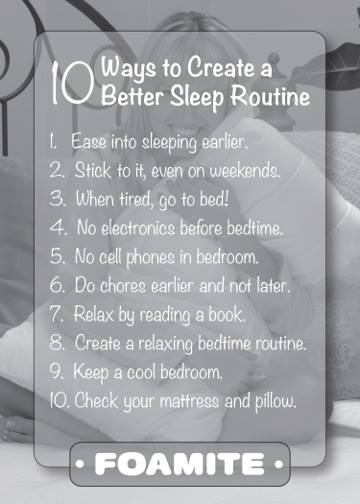Keep a regular sleep schedule
Getting in sync with your body’s natural sleep/wake cycle is the key to good sleep. You will feel more refreshed and energized.
Set a regular bedtime
Having regular sleep and wake times each day, even on weekends, will help condition your body’s natural sleep/wake cycle. If you tend to stay up later on weekends, make sure you still try to wake up at your regular time or at most an hour later. You can always make up for lost sleep with a short nap.
Wake up at the same time
If you’re getting enough sleep, you should wake up naturally without an alarm. If you do, then it could be a sign that you are not getting enough sleep, perhaps you need to start sleeping earlier.
Nap to make up for lost sleep
Most of us have a natural dip in alertness between 2 – 4 pm (depending on when you wake up and start working). A quick power nap can be extremely effective to recharge. You should limit your nap to less than 30 minutes to prevent from entering into a state of deep sleep. If you do you will feel even worse when you wake up.
Fight after-dinner drowsiness
If you’re sleepy after dinner, try some stretching or light chores to keep awake. Falling asleep too early will disrupt your normal sleep cycle. If you have a late after-dinner nap you may wake up in the middle of the night and have trouble falling back to sleep.
Limit shift changes if possible
Shift workers have sleep disturbances due to biological cues from light that affects the body’s natural instinct to sleep. If you do work night shift, to help regulate the body, try to be in as much bright light as possible but in your bedroom, make sure you have black-out curtains to shut out the day light. Limit any caffeine to the early part of your shift. When switching shift cycles, you may need up to a week to adjust to changes in your sleep routine.
Sleep Better to Live Better…
Sincerely,
R.C. (Bob) Dimas
Be the best that you can be by doing whatever is necessary to improve the quality of your sleep!




